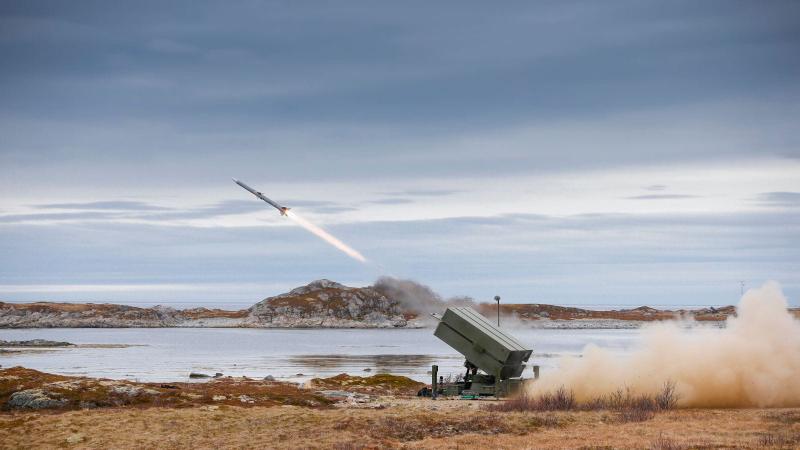The US-Taiwan Business Council called a potential US$2 billion US arms sale package to Taiwan “an important development” and commended both sides for coming to an agreement.
The package is made up of US$1.16 billion in missile systems, and US$828 million in radar systems.
The missile systems are three National Advanced Surface-to-Air Missile Systems (NASAMS), which are being exported to Taiwan for the first time and would make it only the third country in the region with access to them after Australia and Indonesia, according to US Defense officials who spoke on the condition of anonymity, and the radars are AN/TPS-77 and AN/TPS-78 systems.

Photo: Screen grab from RTX Web site
NASAMS have been deployed in Ukraine, and the Ministry of Foreign Affairs called them “proven” in a statement expressing thanks on Friday last week.
The missiles and radar “serve as a significant step forward in the modernization of Taiwan’s air-defense architecture” said the council’s president, Rupert Hammond-Chambers, adding that they represent a “significant broadening” of US President Joe Biden’s administration’s approach to Taiwan’s defense.
The council has often commented on defense matters relating to the two countries, as it hosts the annual US-Taiwan Defense Industry Conference which brings together officials and experts from both nations.
Hammond-Chambers went on to say that this program should lead to “greater consideration of all the military threats posed to Taiwan,” as the radar systems will allow for much more maritime and aerial surveillance of Taiwan to defend against “gray zone” activities by China.
The NASAMS will be integrated into a defense architecture that already includes Patriot-III missile, also American, and Taiwan’s domestically developed Tien-Kung III missile defenses, the statement read.
He called on Taiwan’s military to further strengthen its defenses and ensure adequate supplies of ammunition and missile components in preparation for a conflict.

WANG RELEASED: A police investigation showed that an organized crime group allegedly taught their clients how to pretend to be sick during medical exams Actor Darren Wang (王大陸) and 11 others were released on bail yesterday, after being questioned for allegedly dodging compulsory military service or forging documents to help others avoid serving. Wang, 33, was catapulted into stardom for his role in the coming-of-age film Our Times (我的少女時代). Lately, he has been focusing on developing his entertainment career in China. The New Taipei District Prosecutors’ Office last month began investigating an organized crime group that is allegedly helping men dodge compulsory military service using falsified documents. Police in New Taipei City Yonghe Precinct at the end of last month arrested the main suspect,

A cat named Mikan (蜜柑) has brought in revenue of more than NT$10 million (US$305,390) for the Kaohsiung MRT last year. Mikan, born on April 4, 2020, was a stray cat before being adopted by personnel of Kaohsiung MRT’s Ciaotou Sugar Refinery Station. Mikan was named after a Japanese term for mandarin orange due to his color and because he looks like an orange when curled up. He was named “station master” of Ciaotou Sugar Refinery Station in September 2020, and has since become famous. With Kaohsiung MRT’s branding, along with the release of a set of cultural and creative products, station master Mikan

RISING TOURISM: A survey showed that tourist visits increased by 35 percent last year, while newly created attractions contributed almost half of the growth Changhua County’s Lukang Old Street (鹿港老街) and its surrounding historical area clinched first place among Taiwan’s most successful tourist attractions last year, while no location in eastern Taiwan achieved a spot in the top 20 list, the Tourism Administration said. The listing was created by the Tourism Administration’s Forward-looking Tourism Policy Research office. Last year, the Lukang Old Street and its surrounding area had 17.3 million visitors, more than the 16 million visitors for the Wenhua Road Night Market (文化路夜市) in Chiayi City and 14.5 million visitors at Tainan’s Anping (安平) historical area, it said. The Taipei 101 skyscraper and its environs —

Taiwan on Friday said a New Zealand hamburger restaurant has apologized for a racist remark to a Taiwanese customer after reports that it had first apologized to China sparked outrage in Taiwan. An image posted on Threads by a Taiwanese who ate at Fergburger in Queenstown showed that their receipt dated Sunday last week included the words “Ching Chang,” a racial slur. The Chinese Consulate-General in Christchurch in a statement on Thursday said it had received and accepted an apology from the restaurant over the incident. The comment triggered an online furor among Taiwanese who saw it as an insult to the